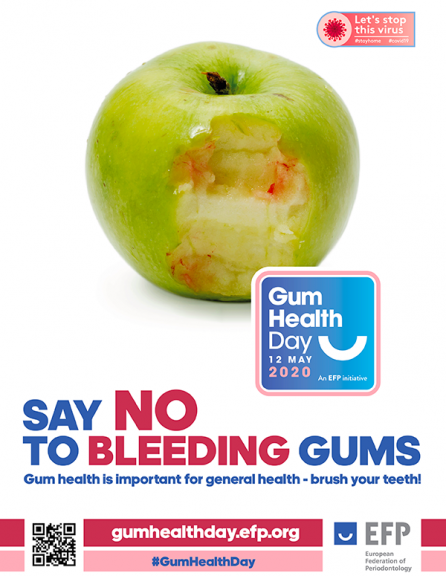Gum health expert Prof. Lijian Jin says no to bleeding gums on Gum Health Day

To celebrate Gum Health Day, FDI sat down with periodontology expert Prof. Lijian Jin of Hong Kong to discuss the importance of life-long gum health. Prof. Jin is one of four experts on FDI’s Global Periodontal Health Project Task Team. The Task Team provides guidance and scientific expertise to ensure sound implementation of the Global Periodontal Health Project, which aims to reduce and prevent gum disease worldwide. Prof. Joerg Meyle, Prof. David Herrera, and Prof. Stefan Renvert work side-by-side with Prof. Jin to support FDI’s work to promote periodontal health.
1. The theme of Gum Health Day 2020 is “Say no to bleeding gums.” Why should people take their bleeding gums seriously?
Gum disease is a relatively silent epidemic, meaning that it can go undetected if we don’t recognize the early warning signs. We can live with gum disease for quite a long time without experiencing any pain or discomfort.
Gum bleeding is actually one of the earliest, most visible signs of gum disease. Gum bleeding is very obvious: you can’t deny it.
If you’ve got gum bleeding, you should seek professional dental care as early as possible. This is particularly true for young people: stop gingivitis in its tracks before it progresses to periodontitis, a more serious form of gum disease.
Early awareness of gum bleeding is so important. If caught early, gingivitis can be easily controlled and reversed. The problem is that for some susceptible people, gingivitis can quickly get out of control and turn into early- to late-stage periodontitis. And then it’s too late. Importantly, periodontitis is irreversible. Once the gum tissue is destroyed, you cannot get its natural structure back.
So, why should we focus on gum bleeding in particular? Well, gum disease is not always linked to pain, like tooth decay often is. Many periodontitis patients miss the opportunity to care for their gums because they don’t realize what is going on. Self-awareness of gum disease is relatively low among the public, compared to tooth decay. By raising awareness of gum bleeding as one of the earliest warning signs of gum disease, patients can take action early and achieve life-long gum health.
2. How do gum diseases impact quality of life?
For patients with severe periodontitis, there are significant effects on quality of life. A leading cause for partial or complete tooth loss in adults is severe or uncontrolled periodontitis.
Obviously, missing teeth affect our ability to chew. Limited chewing function negatively impacts our diets, nutritional intake, and general health. Missing teeth also affect speech and pronunciation, especially if the front teeth are missing.
Severe gum disease affects self-esteem and dampens our spirits. We might feel ashamed and avoid social interactions. We lose confidence. Signs of gum disease, including bleeding gums and halitosis (bad breath) may contribute to a loss of self-confidence. Multiple visits to the periodontist for intensive treatment and care are also stressful and expensive.
What’s more, scientific evidence shows that periodontitis is closely linked to many systemic diseases, including diabetes, cardiovascular disease, some forms of cancer, dementia, and even depression.
3. What are the direct and indirect economic costs of leaving gum diseases untreated?
According to the 2001 Guinness Book of World Records, gum disease is the most common disease worldwide. The 2010 Global Burden of Disease Study shows that severe periodontitis is the sixth most prevalent disease in the world (Kassebaum et al. 2014). Tooth decay is the most prevalent disease worldwide (Marcenes et al. 2013). Clearly, the global burden of gum disease remains high.
Population growth trends, changes in risk factors and improved tooth retention will increase the socio-economic burden of periodontitis globally that is responsible for 3.5 million years lived with disability and 54 billion USD/year in lost productivity. This significantly contributes to a major portion of the 442 billion USD/year direct and indirect costs of oral diseases in 2010, according to reports by Listl et al. (2015), the GBD 2015 Disease and Injury Incidence and Prevalence Collaborators (2016) and Tonetti et al. (2017).
4. What are the main risk factors for developing gum disease? What role does the oral microbiome have to play here?
Gum disease share common risk factors with systemic diseases, including cardiovascular disease and diabetes. Some of these risk factors include smoking; poor oral hygiene; processed, high-sugar diets; lack of physical activity; poor sleeping habits; and high stress.
Gum disease begins with an imbalance of the plaque biofilm-host interaction and the breakdown of microbe-host homeostasis, and progress due to dysregulated immuno-inflammatory responses in susceptible individuals with various environmental and host risk factors (e.g. tobacco use and diabetes mellitus).
5. Let’s talk about the importance of prevention. What is the best way to prevent gum disease from appearing in the first place?
This is a core component of our work as experts in periodontology. Overwhelming evidence indicates that periodontitis can be treated and effectively managed in the majority of cases.
This advice applies to everyone: practice gum health self-awareness and seek treatment at the earliest stage of disease. Then, maintain good gum health for the rest of your life.
These are the best ways to prevent gum disease:
- Effective daily plaque control, through appropriate brushing and use of interdental cleaning aids (e.g., interdental brushes and dental floss). Use a single-tuft toothbrush to access hard-to-reach areas.
- Self-awareness: pay attention to what’s happening in your mouth. Gum bleeding is one of the most important, objective signs of your gum disease.
- Seek help from the dentist as soon as you recognize signs of gum disease. Visit the dentist regularly to keep your gums and mouth healthy throughout your life.
- Adopt a healthy lifestyle: exercise, eat well, practice good sleep hygiene, and find ways to effectively manage your stress.
Good habits start early: I think that prevention strategies should be learned starting from primary school.
6. If there’s one thing you could say to your patients regarding their gum health, what would it be?
Life is short, and your health is invaluable. Your own gum health is one of your most valuable assets, and you need to keep it. Good gum health is a gift that we need to cherish throughout our lives.



